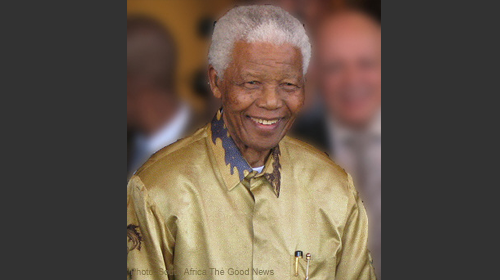
Nelson Mandela's life is a rebuke to oppression and to those who would respond with frustrated resignation or hatred. It is difficult to imagine a more unlikely success story against seemingly impossible odds. South Africa's system of apartheid seemed like the purest manifestation of racial discrimination possible. The fact that the discrimination was perpetrated by a small minority of whites against a majority of blacks in their own native land dictated that the means of maintaining the cruel racial hierarchy be extreme and pervasive. That the principal actor in the destruction of this unjust system would be an activist sentenced to life imprisonment in South Africa's notorious Robben Island is nearly miraculous.
The ferocious injustice in South Africa could only yield to a movement led by a person of extraordinary character. Nelson Mandela was such a person. Combining an undying intolerance of inequality and a steely determination with warmth, a sense of humor, forgiveness and an almost other-worldly grace, Mandela led the negotiations that allowed for a peaceful transition to a government which, for the first time, included all South Africans. Predictions of violent retribution for the previous injustice proved unfounded. Full retribution for prior abuses would be difficult, if not impossible, but Mandela's insistence on a process of truth and reconciliation and his personal example of forgiveness for the people who had brutalized him and his colleagues permitted the country to move forward while permitting the horrid stories of the era of apartheid to be aired.
I had the opportunity to experience firsthand the enormous scope of changes that have occurred in South Africa. Shortly after the end of Mr. Mandela's first term, I, along with a team of other civil rights attorneys, travelled to South Africa to share our experience regarding attempts to further civil and human rights. We quickly learned that the South African Constitution's protections of basic civil rights were far more extensive than our own and that this broad scope reflected the broad, pioneering vision of fairness and inclusiveness advocated so effectively by Mr. Mandela.
Through his efforts, Mandela became a leader not only of his country but of the world. Any expectations that all of South Africa's racial and economic difficulties could be completely solved in a relatively short period of time are unrealistic. But Mandela's accomplishments during that short period created a legacy that will be difficult to match. It is hard to imagine any individual who will be able to capture the imagination of the entire world and make such an enormous difference in the lives of his people. But as we individually face the seemingly intractable effects of persistent discrimination all over the world, it would be good to remember this man who, like a modern David, faced the Goliath of discrimination and oppression and changed the world.
Learn more about racial discrimination and other civil liberty issues: Sign up for breaking news alerts, follow us on Twitter, and like us on Facebook.


